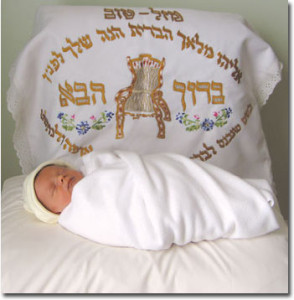The Bris Ceremony
The Bris ceremony is a very special occasion and is accompanied by much happiness and rejoicing. The ceremony usually takes place at home, in a synagogue or at a catering hall. There are several honors to be conferred during the ceremony, usually bestowed upon the relatives and close friends of the baby’s family. A brief description of the ceremony as follows: Couple enters with the baby and the baby is placed on a chair designated as the chair of Elijah. The baby is then placed upon the lap of the Sandek (most often a grandfather) who holds the baby during the circumcision procedure. After the appropriate blessing is recited, the circumcision is performed by the mohel. Immediately following the Bris, another blessing is said over a cup of wine, and the baby receives his official Hebrew name, which he will proudly carry throughout his life. The newborn child is often named after departed relatives, a symbolic source of continued life for those no longer with us. The ceremony ends with the resounding wish of “Mazel Tov!” followed by the serving of refreshments or a light meal. The ceremony is performed in Hebrew and English for all participants to understand and appreciate.
THE MOHEL
Traditionally, the parents engage a mohel to perform the Bris. A mohel is a person who is specially trained in the medical and surgical techniques of circumcision. In addition to being an expert in his field, the mohel is also an expert in the Jewish laws pertaining to Bris Milah. A doctor’s medical circumcision, usually performed in the hospital within the first few days after birth, does not fulfill the requirements of a Bris Milah and is not considered valid according to Jewish law. The Bris must be performed by a Jewish person who understands, upholds and practices the tenets of the Jewish religion and is specially trained to function as a mohel.
THE BABY
The Bris of a healthy baby is done on the eighth day of life (counting the day of birth). This is so even if the eighth day falls on Shabbat, Yom Kippur or any other Jewish festival. However, in the case of a baby born by Caesarean section, the Bris is not performed on Shabbat or on a festival, but on the day following. Bris Milah may not be performed before the eighth day or at night. In the event that a baby is not in perfect health — even if not seriously ill — the Bris is delayed until both the doctor and the mohel are in agreement as to the healthy status of the baby. A common example of this situation is newborn jaundice. However, in the case of serious illness, a delay of one week following full recovery is required.
A Joyous Beginning
A bris milah performed according to Jewish tradition is a wonderful beginning for a newborn child. It is a memorable experience, replete with significance and meaning for all those involved — the first of many milestones and happy occasions to be joyously celebrated during the child’s life, as he grows to be a source of nachas and satisfaction to all those close to him. MAZEL TOV!

